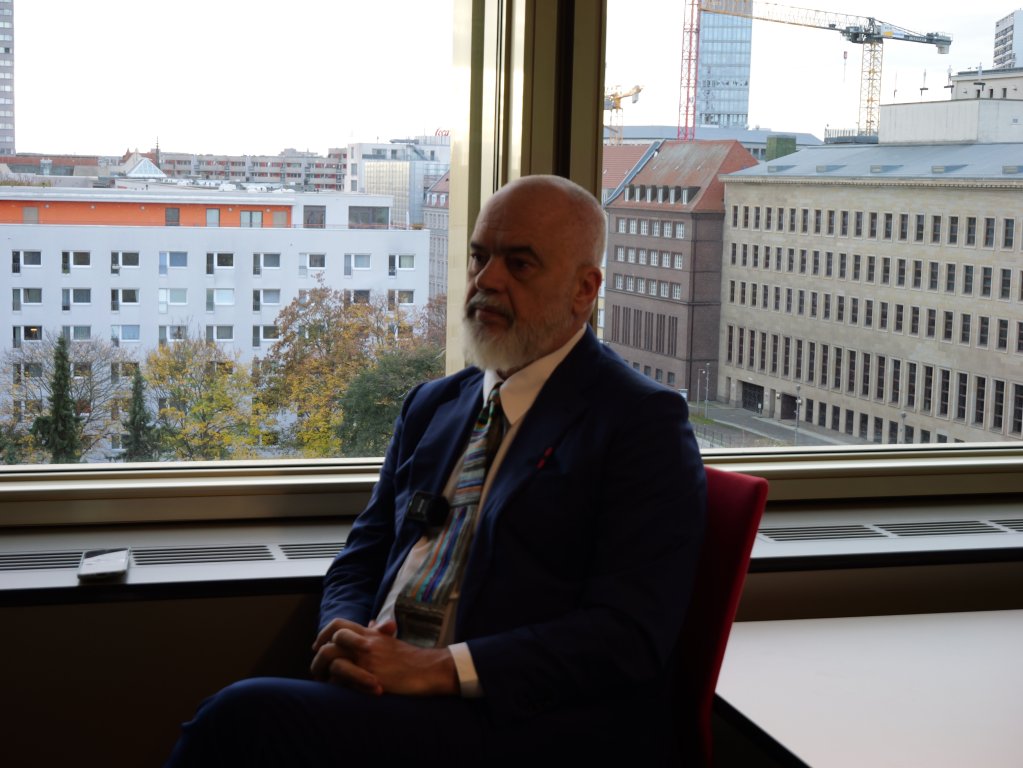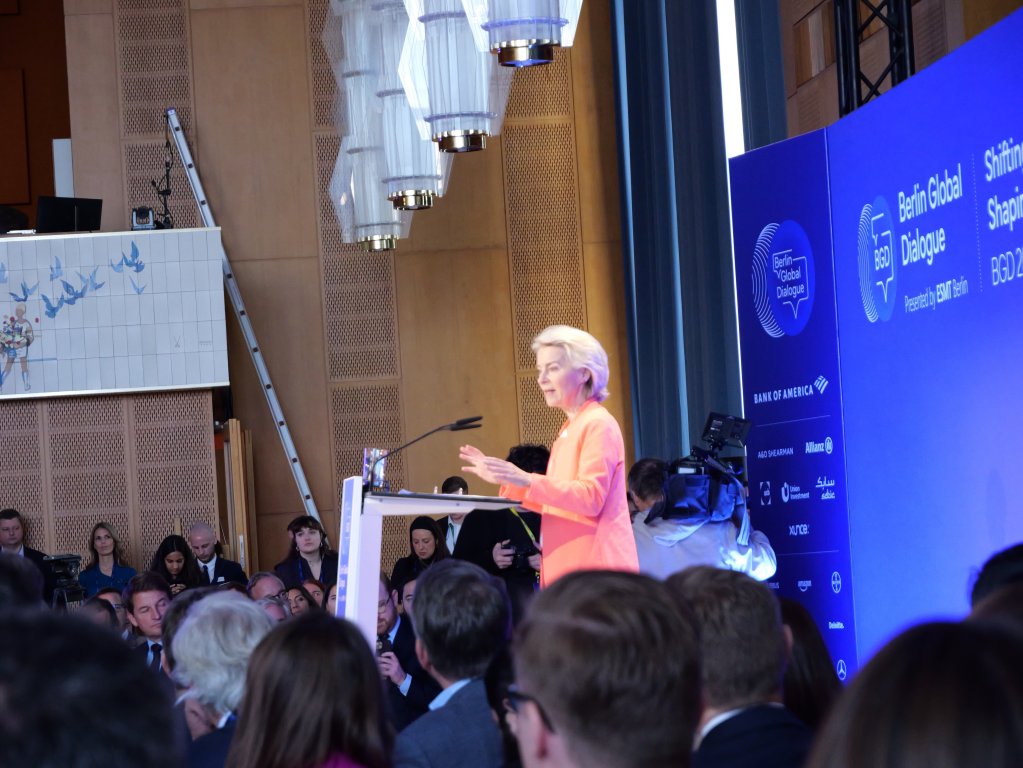Italy's migrant return centers in Albania have "stumbled in the Italian courts" and been suspended, Prime Minister Edi Rama has told InfoMigrants in an interview. "The Italians do whatever they have to do." Rama also stressed that Albania would not be accepting any irregular migrants from the UK.
Italy's transfer of irregular migrants to detention centers in Albania has been suspended for the time being, Albania's Prime Minister Edi Rami told InfoMigrants on Saturday (October 25).
"The deal has stumbled in the Italian courts, but that is not our problem," Rama said.
"When it comes to the deal with Italy," Rama explained, referring to the contested Italian migrant camps built in Albania a year ago to detain people intercepted at sea, "ask the Italians because it's not part of our story."
"Our part of the story is very simple: We have offered them (Italy) a piece of land, we have offered them sovereignty over that piece of land and in that piece of land there is Italian territory and the Italians do whatever they have to do," Rama told InfoMigrants during his visit to Berlin over the weekend.
"If they have issues with their own justice [system], it's not our problem."
The centers, built in Shengjin and Gjader, had been intended to house 3,000 migrants per month as part of Europe's first "offshoring" scheme.
'Ask the Italians'
Rama was asked whether he felt certain there would be no transfer of migrants from Italy to Albania on boats in the foreseeable future and repeated: "You will have to ask the Italians, I don't know."
On why Albania felt it had to set up the migrant return hubs in the first place, the prime minister emphasized: "Because of the very special relationship with Italy," but did not elaborate further.
Regarding concerns about corruption or financial bribery involving state authorities, human traffickers, and migrant smugglers within the Balkan country and at its borders, Rama responded: "No, we are not concerned about that, we don't have that."

Albania will not accept migrant returns on behalf of UK, says Rama
The prime minister reiterated to InfoMigrants that Albania would not host irregular migrants in centers on behalf of the UK.
"The UK has not been pushing for some time now because we made it clear that we would not accept any return hub in Albania," Rama said, stressing once again: "When it comes to Italy, it's a deal we made with Italy, because Italy is very special to us."
A week ago, the Albanian prime minister visited the UK at the invitation of British Prime Minister Keir Starmer, who had invited leaders from Western Balkan countries, including Rama. North Macedonia, Montenegro, Serbia, Bosnia and Herzegovina, and Kosovo were also present to discuss strategies for tackling migration, as the UK seeks to reduce irregular migrant arrivals. The UK is in ongoing talks with some of these countries to establish the so-called return hubs, where failed asylum seekers could be sent before deportation.
At London's Chatham House on October 21, Rama had already refused to host any return hubs, stating: "Never in Albania."
Asked whether he would consider hosting a hub if the UK decided to invest in infrastructure, specifically railways, in Albania. He reportedly said: "We definitely accept it, if they would invest 10 billion euros [1.16 billion dollars] into building railways," according to the UK's PA Media.
During a visit to Albania in May, British Prime Minister Starmer already expressed interest in creating "return hubs." At the time Rama, appeared hesitant and stated that the Italian model "takes time to test."
"If it works, it can be replicated. But not in Albania, elsewhere in the region," he added.
A year on, Italy's Albania migrant hubs lie nearly empty
One year has passed since Italy opened its migrant camps in the Balkan country. Today, the Shengjin and Gjader centers in northern Albania lie practically empty.
Italian judges have repeatedly blocked deportations, stalling plans to hold up to 3,000 migrants in the Albanian camps.
Obtaining official information about the program and camp conditions has been difficult. Numerous NGOs, however, have condemned the living conditions inside the camps, and Italian courts have blocked several deportations to Albania.
A report by a coalition of NGOs documented at least nine suicide attempts and 21 cases of self-harm among detainees in Albania.
Yet, as the European Union debates creating its own "return hubs," Italy’s far-right government remains determined to use offshore detention centres in Albania.
Italy opened the centers on October 16, 2024. That same day, dozens of cameras captured the arrival of the first Italian naval ship carrying 16 men from Egypt and Bangladesh, intercepted at sea as they attempted to reach the EU. Their identities were verified at the port before they were transferred to the Gjader camp to await asylum processing, if they chose to apply.
Within hours, four of the men were identified as "vulnerable" and sent back to Italy. Two days later, the remaining 12 were also returned after an Italian court ruled against their detention.
The court cited disagreements over the government’s list of "safe" origin countries, which included countries that did not meet European legal criteria.
A report by Italian NGOs found that a total of 132 people had been transferred to the Albanian centers. Of these, only 32 were repatriated, though it remains unclear how many were returned to Italy or sent elsewhere, French news agency AFP reported, citing legal expert Gianfranco Schiavone, a member of the ASGI network (The Italian Association for Juridical Studies on Migration) and a lawyer.
'We will see in the end whether they will work,' says Meloni
Earlier this month, Italian Prime Minister Giorgia Meloni spoke on the issue of migration in her communication to both the Italian upper and lower houses of parliament, insisting that her government's migration policies were working.
"Migrant boat landings have decreased by 30 percent and repatriations have increased by 52 percent," she said, adding that the choice of migrant centers in Albania was also a choice she continued to stand by.
"We will see in the end whether they will work," she said during her speech at the Chamber of Deputies, "but I want to ask a question: does it not seem bizarre that, in the European Commission proposal of a European list of safe countries there are all the nations from which migrants arrive for which Italian judges have not authorized their transfer to Albania. Who is right and who is wrong?" Meloni said according to Italian news agency ANSA. "Has Europe become xenophobic or are there some judges who make choices based on ideological reasons? One of the two must be right and the other wrong."
EU debate could shape future of Italy’s offshore migrant centers in Albania
Amid ongoing legal challenges, Italy plans to use the camps as detention facilities for migrants awaiting deportation after being declared "illegal" by Italian authorities.

Schiavone warned that such repurposing would probably face further legal obstacles: "There is no provision for the administrative detention of foreigners awaiting expulsion in Italy to be carried out in a non-EU country." This could change, however, if the "return regulation" currently under debate in the European Parliament is adopted. The proposed framework would allow the creation of migrant centers outside the EU’s borders.
Since taking office in 2022, Meloni has made combating irregular immigration a cornerstone of her government’s agenda. Legal validation of her offshore detention policy would mark a significant political victory for her far-right Fratelli d’Italia (FDI) party, and would also allow the EU to move forward with its own plans for increasing repatriations of those who are refused asylum in the bloc.
